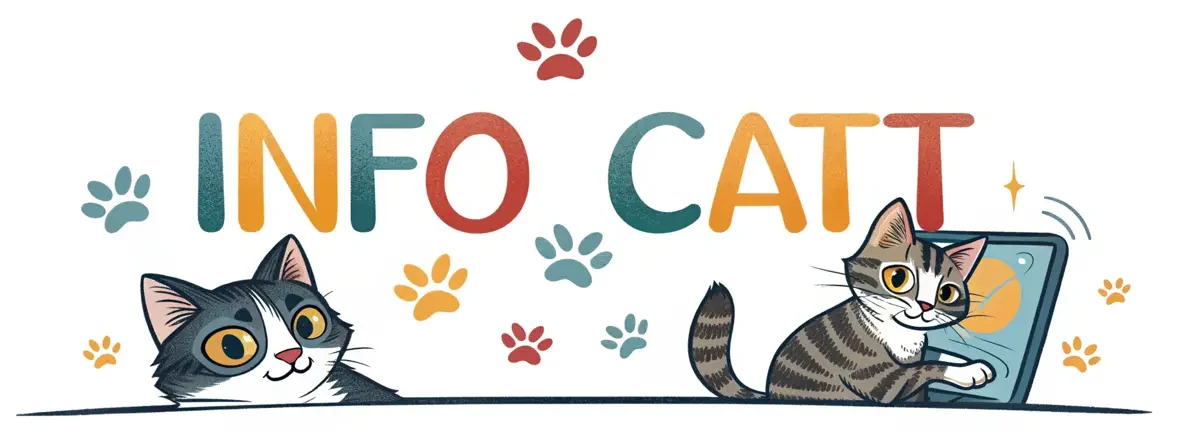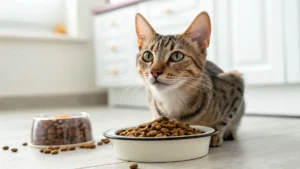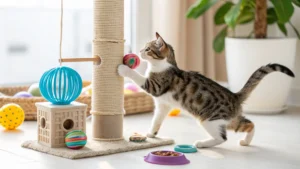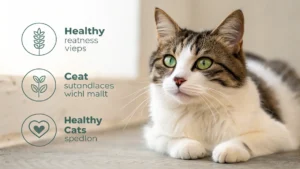Every cat owner knows the deep bond with their feline friend. Keeping your cat healthy is more than just medical care. It’s about creating a loving space that supports their well-being.
Your cat needs more than just food and a place to sleep. A good cat wellness routine includes nutrition, exercise, mental play, and health checks. By following smart tips, you can help your cat live a happy, healthy life.
This guide will show you how to keep your cat healthy. We’ll cover nutrition, exercise, and mental play. You’ll learn how to support your cat’s physical and emotional health.
Essential Components of a Cat Wellness Routine
To keep your cat healthy, you need a complete care plan. A good wellness routine helps prevent health problems. It ensures your cat stays happy and healthy for a long time. Here are some key tips for your cat’s well-being.
Your cat care guide should cover several important areas. These areas help keep your cat healthy and comfortable. Let’s look at the most important parts of your cat’s health.
Regular Veterinary Check-ups and Vaccinations
Preventive care is key for your cat’s health. Make sure to schedule yearly vet visits. These visits are crucial for:
- Detecting health issues early
- Keeping vaccinations up to date
- Comprehensive health screenings
- Addressing any concerns
Maintaining Proper Dental Care
Oral health is vital for your cat’s overall health. Start a dental care routine that includes:
- Regular teeth brushing
- Dental treats and toys
- Professional dental cleanings
- Monitoring for dental disease
Grooming and Hygiene Practices
Grooming is important for your cat’s health and your bond with them. Focus on:
- Regular brushing to remove loose fur
- Nail trimming
- Checking ears and eyes
- Occasional bathing when needed
Remember, each cat is unique. Talk to your vet to create a wellness plan that fits your cat’s needs.
How Do You Keep Your Cat Healthy Through Proper Nutrition
Keeping your cat healthy starts with the right food. Indoor cats face special challenges that need a smart feeding plan. This plan is key to their health and happiness.
Choosing the right food is vital. Your cat needs a balanced diet that meets their needs. Here are some important tips:
- Select high-quality protein sources as the primary ingredient
- Ensure appropriate calorie intake based on age and activity level
- Provide wet and dry food options for variety
- Monitor portion sizes to prevent obesity
Veterinary nutritionists recommend focusing on age-specific dietary requirements. Kittens, adult cats, and seniors have different needs. These needs change as they grow older.
“Nutrition is the foundation of your cat’s health and longevity” – Dr. Susan Roberts, Feline Nutrition Specialist
Water is also crucial for your cat’s health. Make sure they always have fresh, clean water. Indoor cats can get dehydrated easily. Try using wet food or water fountains to help them drink more.
Watch your indoor cat’s metabolism closely. Since they’re less active, you must manage their diet carefully. This helps prevent weight gain and health issues.
Creating an Enriching Environment for Your Feline Friend
Cats love environments that spark their natural instincts. They need places that keep them active and mentally sharp. A well-designed space can turn your home into a cat paradise, boosting their happiness and health.
To create the perfect cat-friendly space, you need to plan carefully. It’s not just about playtime. It’s about designing areas that challenge and thrill them.
Setting Up Safe Play Areas
It’s key to encourage your cat’s natural behaviors through exercise. Here are some ideas:
- Install cat trees near windows for vertical exploration
- Create climbing zones with wall-mounted shelves
- Use scratching posts in multiple locations
- Designate play spaces with interactive toys
Providing Mental Stimulation Tools
Keep your cat’s mind active with fun activities. Puzzle feeders, treat-dispensing toys, and changing play options can fight boredom and support their brain health.
- Introduce interactive electronic toys
- Use puzzle feeders during mealtime
- Rotate toys to maintain novelty
- Schedule daily play sessions
Establishing Comfortable Rest Spaces
While keeping your cat’s mind active is vital, they also need quiet, cozy spots to rest. Choose soft beds, quiet corners, and warm spots for their comfort and security.
A stimulated cat is a happy cat – design your home with their natural instincts in mind!
Recognizing Signs of Good Health and Potential Issues
It’s important to watch your cat’s health closely. Knowing the signs of a healthy cat helps you care for them better. Your cat shows how they’re doing through their body and behavior.
Here are the main signs of a healthy cat:
- Bright, clear eyes without discharge
- Clean ears free from wax buildup
- Shiny, smooth coat without bald patches
- Consistent appetite and water intake
- Regular bathroom habits
- Active and playful demeanor
Improving your cat’s health starts with paying attention. Look out for signs that might mean they’re not feeling well:
- Sudden changes in eating or drinking patterns
- Unexplained weight loss or gain
- Lethargy or decreased activity levels
- Unusual grooming behaviors
- Persistent vomiting or diarrhea
Regular vet visits are key for keeping your cat healthy. Early detection can prevent minor issues from becoming serious medical conditions. Your quick action and care can greatly improve your cat’s health and happiness.
Remember: Your cat relies on you to interpret their health signals and provide timely care.
Conclusion
Your journey to providing vet-approved cat care is more than just keeping up appearances. It’s about building a cat wellness routine that boosts their health and happiness. By using the tips from this article, you can switch from just reacting to health issues to actively keeping your cat healthy.
Every part of cat care, from food to vet visits and fun activities, is key to their health. Paying close attention to these areas helps your cat live a better life. It also lowers health risks. Showing you care about their needs is the heart of a strong bond with your cat.
Good cat care needs patience, watching, and a desire to learn. Talking to your vet often gives you special advice for your cat’s health. With knowledge and care, you’ll help your cat stay joyful, healthy, and a beloved family member.
Start now by checking how you care for your cat and find ways to do better. Your hard work will pay off with a lively, loving cat who feels safe and loved.
FAQ
How often should I take my cat to the veterinarian?
Adult cats need annual check-ups, while senior cats (7+ years) should go every six months. Kittens need to see the vet every 3-4 weeks until they’re 16 weeks old. These visits help find health problems early and keep your cat healthy.
What are the most important nutrients for my cat’s diet?
Cats need lots of animal protein and amino acids like taurine. Choose foods with real meat first. They should have balanced protein, fats, and little carbs. Wet food is good for keeping them hydrated.
How can I help my indoor cat stay active and healthy?
Give them toys, climbing trees, and scratching posts. Play with them for 10-15 minutes a day. Use puzzle feeders and change toys often to keep them interested.
What are the signs that my cat might be experiencing health problems?
Look for changes in appetite, lethargy, weight changes, and water use. Also, watch for litter box issues, vomiting, aggression, and grooming changes. Any sudden changes need vet attention.
How important is dental care for cats?
Dental care is key for cats. Brush their teeth with cat toothpaste, give dental treatments, and get vet cleanings. Bad dental health can cause serious problems like heart and kidney issues.
What type of litter is best for my cat?
Pick a low-dust, clumping litter that’s easy on their paws. Some cats like fine textures, while others may be sensitive. Unscented litters are best to keep them using the box. Keep the litter area clean to prevent health issues.
How much water should my cat drink daily?
Cats need 3.5 to 4.5 ounces of water per 5 pounds of body weight daily. Offer multiple water sources and use water fountains. Wet food also helps with hydration.
Can indoor cats get enough exercise?
Yes! Indoor cats can stay active with the right effort. Create vertical spaces, use interactive toys, and play games. Consider harness training for outdoor play. The goal is to keep them engaged and active.



